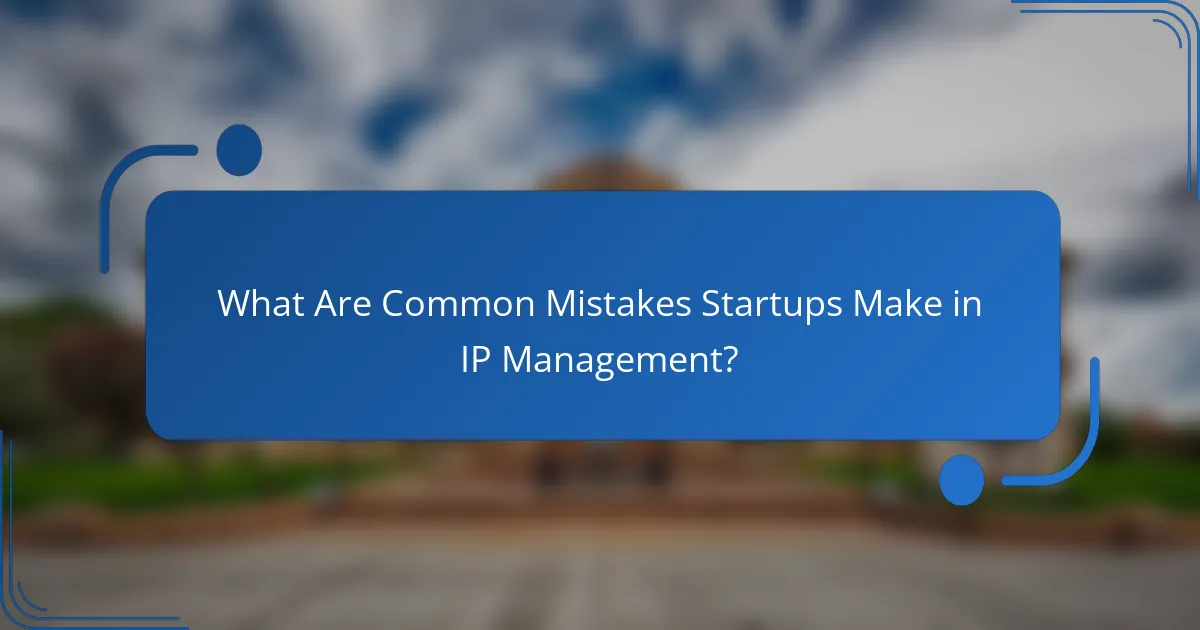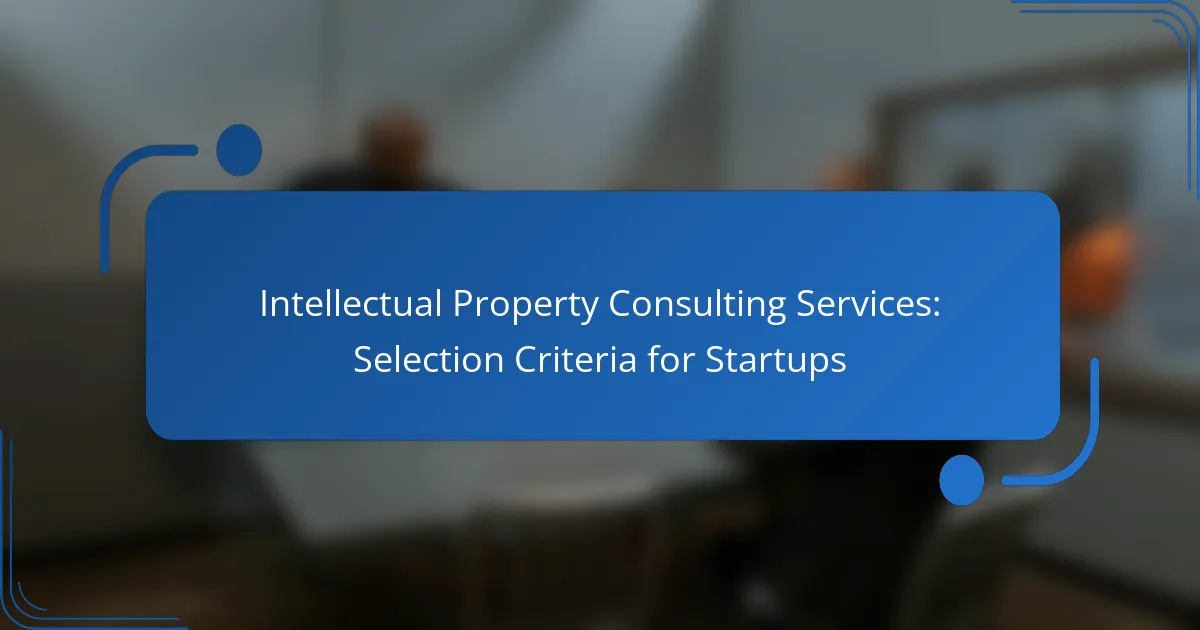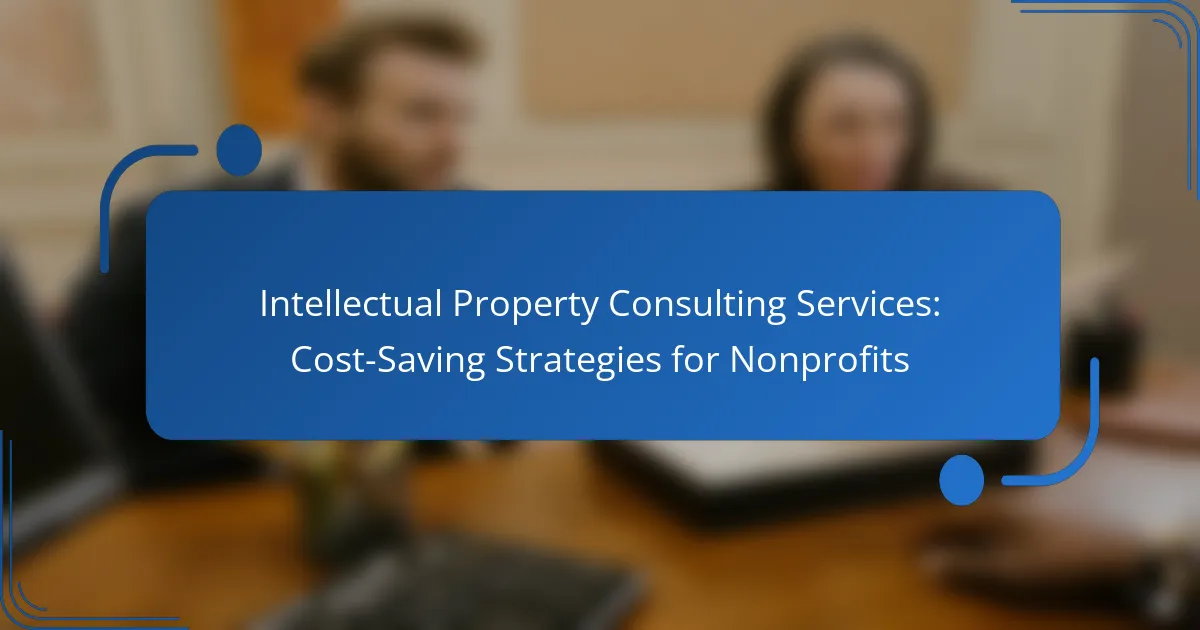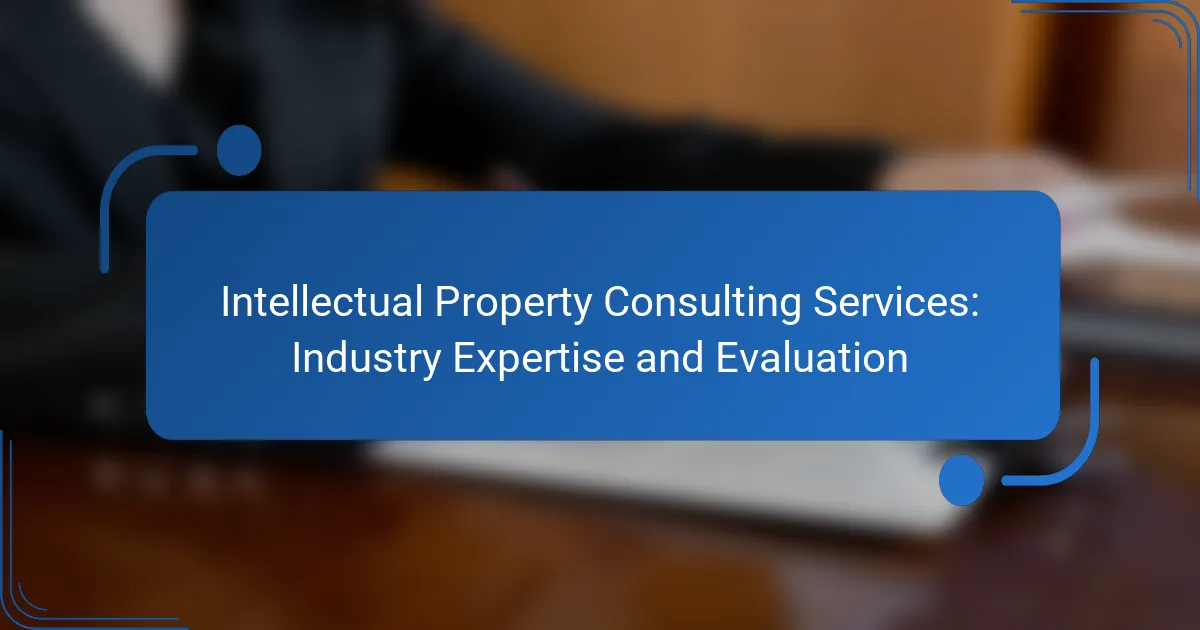When selecting intellectual property consulting services, startups must focus on criteria that cater to their unique requirements. Prioritizing factors such as the consultant’s experience with startups, industry-specific knowledge, and service offerings can greatly enhance a startup’s ability to protect and monetize its innovations.

What Are the Key Selection Criteria for Intellectual Property Consulting Services?
When selecting intellectual property consulting services, startups should prioritize criteria that ensure their unique needs are met effectively. Key factors include the consultant’s experience with startups, industry-specific expertise, reputation, service offerings, and pricing structure.
Experience with startups
Consultants with a proven track record of working with startups understand the unique challenges these businesses face. They are more likely to provide tailored advice that aligns with the fast-paced and resource-constrained environment of a startup.
Look for consultants who have successfully guided startups through the intellectual property process, from patent applications to trademark registrations. Their familiarity with startup dynamics can lead to more effective strategies and quicker results.
Industry-specific expertise
Choosing a consultant with expertise in your specific industry can significantly enhance the quality of advice you receive. Different sectors have unique intellectual property challenges and regulations, which an industry-savvy consultant can navigate more effectively.
For instance, a consultant experienced in technology startups may have insights into software patents and trade secrets, while one focused on pharmaceuticals will be more adept at handling regulatory compliance and patenting processes specific to that field.
Reputation and client reviews
Assessing a consultant’s reputation through client reviews and testimonials is crucial. Positive feedback from previous clients can indicate reliability and effectiveness in delivering results.
Consider checking online platforms or industry forums for reviews, and don’t hesitate to ask for references. A strong reputation often correlates with a consultant’s ability to provide valuable insights and successful outcomes.
Service offerings
Review the range of services offered by potential consultants to ensure they meet your startup’s needs. Services may include patent filing, trademark registration, IP strategy development, and enforcement support.
Some consultants may also provide additional resources like workshops or training sessions on intellectual property management, which can be beneficial for your team. Ensure that the services align with your current and future IP needs.
Pricing structure
Understanding the pricing structure of intellectual property consulting services is essential for budgeting. Consultants may charge hourly rates, flat fees for specific services, or retainers for ongoing support.
Compare pricing among different consultants, but also consider the value of the services provided. Sometimes, a higher price may reflect greater expertise or a more comprehensive service package, which could save you money in the long run.

How to Evaluate Intellectual Property Consultants?
To evaluate intellectual property consultants effectively, consider their expertise, experience, and the specific services they offer. A thorough assessment will help ensure that the consultant aligns with your startup’s needs and can provide valuable guidance in protecting your intellectual assets.
Initial consultations
Initial consultations are crucial for establishing rapport and understanding the consultant’s approach. During this meeting, assess their communication skills, willingness to listen, and ability to explain complex concepts in simple terms. Look for consultants who offer a free or low-cost initial consultation to gauge their fit without significant financial commitment.
Prepare a list of questions to ask during the consultation, focusing on their experience with startups and specific intellectual property issues relevant to your business. This will help you determine if they can address your unique challenges effectively.
Case studies and success stories
Reviewing case studies and success stories can provide insight into a consultant’s track record. Look for examples that demonstrate their ability to help startups navigate intellectual property challenges successfully. A strong consultant should have documented cases where they have helped clients secure patents, trademarks, or copyrights.
Ask for references from previous clients, particularly those in similar industries or stages of development. This feedback can offer valuable perspectives on the consultant’s effectiveness and reliability.
Comparison of service packages
When comparing service packages, consider the range of services offered, including patent filing, trademark registration, and ongoing IP management. Some consultants may provide bundled services at a discounted rate, while others might charge a la carte for each service. Evaluate which model aligns best with your startup’s budget and needs.
It’s also essential to understand the pricing structure. Some consultants may charge hourly rates, while others offer fixed fees for specific services. Be sure to clarify any additional costs that may arise during the process, such as government filing fees or maintenance costs for registered intellectual property.

What Are the Benefits of Hiring an Intellectual Property Consultant?
Hiring an intellectual property (IP) consultant can significantly enhance a startup’s ability to navigate the complex landscape of IP rights, leading to better protection and monetization of innovations. These professionals provide tailored strategies that align with business goals, ensuring that startups can focus on growth while safeguarding their intellectual assets.
Expert guidance on IP strategy
Intellectual property consultants offer specialized knowledge in developing effective IP strategies that suit the unique needs of startups. They assess existing assets, identify potential IP opportunities, and recommend the best approaches for protection, such as patents, trademarks, or copyrights.
For example, a consultant may advise a tech startup to file for a patent early in the product development phase to secure its innovations before competitors can replicate them. This proactive approach can save time and resources in the long run.
Risk management and compliance
Consultants help startups manage risks associated with IP infringement and compliance with relevant laws and regulations. They conduct thorough audits to identify potential vulnerabilities and ensure that the startup adheres to local and international IP laws.
By implementing a robust compliance framework, startups can avoid costly legal disputes and fines. For instance, a consultant might recommend regular training sessions for employees on IP policies to foster a culture of respect for intellectual property.
Enhanced market positioning
Having a solid IP strategy can significantly improve a startup’s market positioning. By protecting unique ideas and branding, startups can differentiate themselves from competitors and create a strong value proposition for investors and customers alike.
For example, a startup with a registered trademark can leverage its brand identity in marketing efforts, enhancing customer loyalty and trust. This competitive edge can lead to increased sales and market share, making the startup more attractive to potential investors.

Which Intellectual Property Consulting Firms Are Recommended for Startups?
Startups seeking intellectual property consulting should consider firms that offer tailored services, affordability, and expertise in navigating IP laws. Recommended firms include LegalZoom, Rocket Lawyer, and IPWatchdog, each providing unique advantages for emerging businesses.
LegalZoom
LegalZoom is a popular choice for startups due to its comprehensive range of services, including trademark registration and patent applications. Their user-friendly platform allows entrepreneurs to easily access legal documents and guidance at competitive prices, often starting around $200 for basic trademark services.
One key benefit of LegalZoom is its extensive resources, including articles and FAQs that help demystify the IP process. However, startups should be aware that while LegalZoom offers convenience, it may not provide the same level of personalized service as traditional law firms.
Rocket Lawyer
Rocket Lawyer is another excellent option for startups, offering a subscription model that allows access to legal documents and consultations with attorneys. This can be particularly beneficial for startups needing ongoing legal support without high upfront costs, with plans typically starting at around $39.99 per month.
In addition to IP services, Rocket Lawyer provides a wide array of legal resources, making it a versatile choice for new businesses. Startups should consider their specific needs and whether a subscription model aligns with their budget and legal requirements.
IPWatchdog
IPWatchdog is a leading resource for intellectual property news and insights, making it invaluable for startups looking to stay informed about IP trends and legal developments. While not a consulting firm in the traditional sense, it offers educational content and connects users with IP professionals for personalized advice.
Startups can benefit from IPWatchdog’s articles and webinars that cover various aspects of intellectual property, from patent strategies to trademark enforcement. However, businesses should be prepared to seek additional legal services if they require direct assistance with IP filings or disputes.

What Are Common Mistakes Startups Make in IP Management?
Startups often overlook critical aspects of intellectual property (IP) management, leading to potential legal issues and lost opportunities. Common mistakes include neglecting to register IP and failing to maintain adequate documentation.
Neglecting IP registration
Many startups underestimate the importance of registering their intellectual property. Failing to secure patents, trademarks, or copyrights can leave innovations vulnerable to infringement and competitors. Without registration, startups may also miss out on potential funding opportunities that require proof of IP ownership.
To avoid this mistake, startups should prioritize IP registration early in their development process. This includes conducting thorough searches to ensure their IP is unique and filing applications with the appropriate authorities, such as the United States Patent and Trademark Office (USPTO) or the European Union Intellectual Property Office (EUIPO).
Inadequate documentation
Inadequate documentation of IP assets can lead to disputes and challenges in asserting ownership. Startups often fail to keep detailed records of their creation processes, which can complicate legal claims and enforcement actions. Proper documentation is essential for proving the originality and timeline of development.
Startups should implement a systematic approach to documenting their IP, including maintaining records of drafts, designs, and communications related to the development of their products or services. Regularly updating this documentation can help establish a clear chain of ownership and support any future legal claims.



